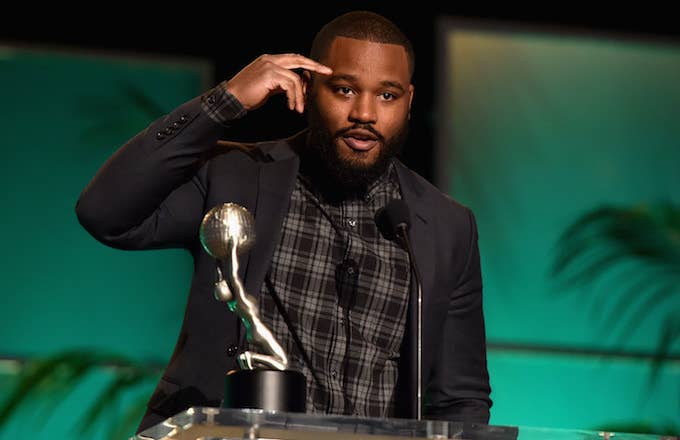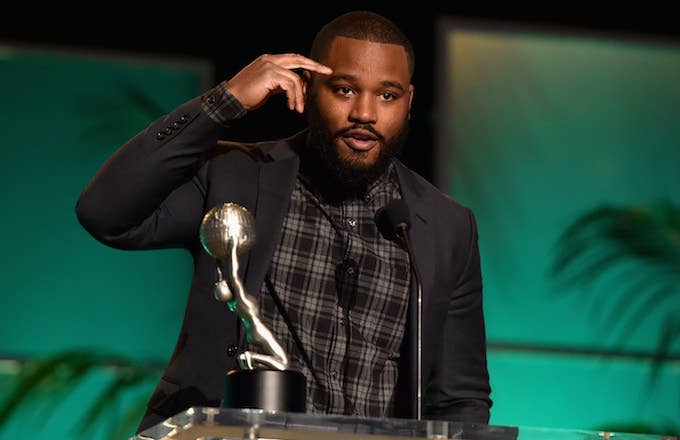
Ryan Coogler knows how to tell stories about real people in unreal situations. His latest film, Black Panther, is further proof of that. Serving as both writer and director of the project, Coogler meticulously weaves narratives, philosophies, afrofuturism, and highly-specific cultural aesthetics together with the excitement and action you’d expect of a spy movie like James Bond while still hitting all the notes of a blockbuster superhero film. Black Panther possesses the same ambition and wonder of the early films that made Steven Spielberg a household name, as well as the statement-making moments of a Spike Lee or Dee Rees. Essentially, Coogler has taken the leap into being one of this generation’s premier filmmakers—an auteur who can make sweeping epics that are visually unforgettable and so gripping that the stories stick with you long after the credits stop rolling—a lane that in the current age seemed to only be occupied by Christopher Nolan.
Over the course of Coogler’s relatively short career, he has told intimate, personal stories about overlooked cultures and the human beings who often fall through society’s cracks.Fruitvale Station, Coogler’s first feature length, was a quiet, anxious film about the final hours of Oscar Grant, a black Oakland resident whose shooting death by a BART police officer in 2009 went viral. In another director’s hands Fruitvale Station could have been just another tragic story, but Coogler captured the gentle, modest moments of Grant (Michael B. Jordan) playing with a stray dog or walking with his daughter on the street that helped humanized the film and give it emotional heft.
It was easier to appreciate what Coogler accomplished in Fruitvale after seeing his second film, Creed. Young and untested, the Oakland native was tapped to breathe life into a dead Rocky franchise. He accomplished this by telling a story about fathers and sons, rich and poor, and the cultures that create us within the confines of a beloved film series. It’s easy to see now why Marvel trusted Coogler with the keys to an important new franchise in their cinematic universe.
Up until recently, Disney, which owns Marvel Studios, has been reluctant to completely hand over the reins to young directors with their own specific styles. The company has never hesitated in taking charge when a project needs to be “controlled” (i.e. the Ant-Man debacle with Edgar Wright and the Rogue One reshoots). With that in mind, watching Black Panther (and to a different extent, Rian Johnson’s The Last Jedi) felt a bit like witnessing a small miracle. Coogler’s big superhero movie is unmistakably a Marvel film—hitting the same notes as the Ironman and Captain America movies—but once you get passed the punches and high production green-screen-coating, what you’re left with is a story about colonialism, family disappointment, and an eternal debate about the best way to save disenfranchised people of color.
The fact that Coogler is only 31 and on his third film is truly shocking. We are witnessing the progression of what could be our greatest working American director.
Coogler set the stage for a broader conversation about the cultural and ideological differences between Africans and African-Americans right from the beginning of Black Panther. Set in Oakland in 1992—a location and time rife with racial tension boiling over—the film opens with two Wakandan brothers arguing the pros and cons of their homeland’s insistance on standing idly by while black people the world over are in suffering. If a powerful and rich African nation like Wakanda actually existed; would their isolationist policy be irresponsible? What are the limits and capabilities of intervention by a foreign country and what does Wakanda owe to foreigners outside of their culture? These are big, bold, and controversial ideas for any film, let alone for a “comic book movie,” yet Coogler pulls it off without things falling apart.
How impressive what Ryan Coogler was able to achieve with Black Panther cannot be overstated. In the midst of this well-crafted superhero action film are extremely sensitive topics about intra-racial politics, black feminism, and geopolitical policy and war, all framed by detailed depictions of a variety of African traditions. These are intensely delicate and messy subjects to tackle and Coogler embraces that baggage and carries it home on a tightrope with a balance and gentleness that few filmmakers, if any, could’ve done. The fact that Coogler is only 31 and on his third film is truly shocking. We are witnessing the progression of what could be our greatest working American director.
With every rewatching of the film, there are different nuances, subtle lines, and Easter eggs that you likely missed in the previous viewing. It’s not a perfect movie but it is a masterful one—like the best Spielberg films, Black Panther has a universal appeal that can resonate with an 8-year-old or an 80-year-old. It’s also a beautiful looking film, from the colors, lighting, and scope of the scenes showcasing the ancestral plane and the way the frame lingers on Erik Killmonger’s back before revealing his face for the first time to the vibrancy and activity that seems to be taking place whenever a large group of Wakandans are shown. There is so much beauty happening on the screen with such grace and choreography that you sit in the theater in awe of its mastery.
As you read this, people are likely still debating, engaging with and thinking obsessively about Black Panther. Like a great work of art, it is a movie that sticks with you and doesn’t let go. You’ll never have a definitive way to answer whether “Killmonger was right” or not but you’ll be talking about it forever in the same way you can’t get over The Dark Knight’s Joker. A great character and a great film do more than entertain, it triggers a switch in your brain that makes you question your worldview. Black Panther is constantly expressing ideas and debates and questions about what it means to be an advanced black nation in a world where people of color are still disenfranchised. The film takes pseudo-intellectual and complex arguments about how black folks “overcome” and tackles them head on—sometimes it’s thoughtful, sometimes it’s sloppy, but either way, it’s admirable.
The thing people often ignore about Spielberg is that he is a master at knowing what to show and what not to show, engaging with your emotions by telling stories about people who are broken and keep you thinking about the broader world and its possibilities—all in the midst of huge movie magic spectacle. Coogler has this same skill and he’s gotten to do something increasingly rare for filmmakers in the age of remakes and comic book movies, he’s been allowed to flex his creative muscles and try daring new things, no matter how ambitious. With Black Panther, he has not only proved that he can come through for the big studios’ bottom lines, but can also make these features intriguing, singular, and artistic while working in what many would consider confined spaces with high expectations. In other words, he is the visionary cinema needs now more than ever.

